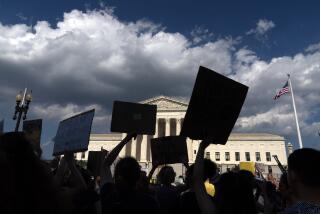Wanted: More Religion Everywhere Except Politics
- Share via
NEW YORK — Americans are wary of religion in the political arena but want more of it in public schools and think U.S. society would benefit if more people became devout, according to a poll released Monday by a secular think tank.
Religion is the best way to strengthen moral behavior and family values, according to 69% of those polled by Public Agenda, a nonpartisan New York-based policy research agency founded by former Secretary of State Cyrus Vance and pollster Daniel Yankelovich. Decreasing greed, materialism and crime, increasing volunteerism and charity work and better child-rearing would be likely if “many more Americans were to become deeply religious,” participants said by majorities ranging from 69% to 87%.
The November poll of 1,507 U.S. adults had a margin of error of 3 percentage points.
Nearly three-quarters of those polled agreed that “it’s a bad idea for families to raise children without any religion.” An equal number, 74%, said school prayer teaches children that belief in God is important, and 56% consider it an effective means of improving youngsters’ behavior.
But majorities said school prayer can be unfair to some families and students. More than twice as many supported a nonsectarian “moment of silence” in classrooms (53%) than prayers addressed to God (20%) or to Jesus (6%). Nineteen percent opposed all such observances.
Public Agenda President Deborah Wadsworth said the results show Americans “believe religion has enormous power to elevate people’s behavior and address many societal problems.” But she said they have “an almost instinctive wariness of injecting religion directly into politics.”
Religious themes were unusually prominent during the 2000 campaign, in part because Democratic vice presidential candidate Joseph Lieberman, an Orthodox Jew, spoke openly of his faith.
Seventy-four percent in the poll thought politicians who talk about their faith “are just saying what people want to hear.” Only 26% said they would be more likely to vote for a candidate who always decides on the basis of religious convictions. Most said compromise is necessary for government officials.
More to Read
Get the L.A. Times Politics newsletter
Deeply reported insights into legislation, politics and policy from Sacramento, Washington and beyond. In your inbox twice per week.
You may occasionally receive promotional content from the Los Angeles Times.










